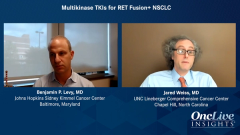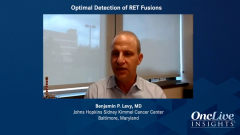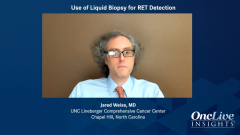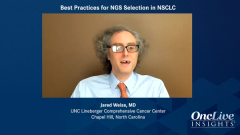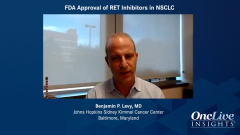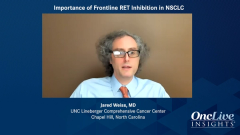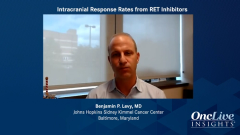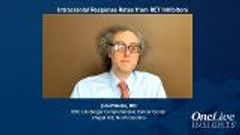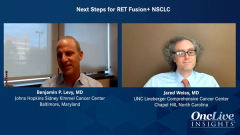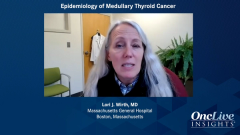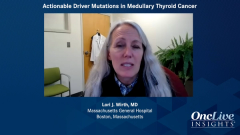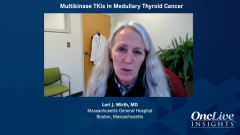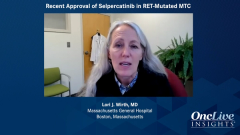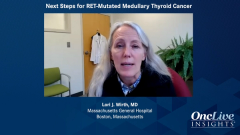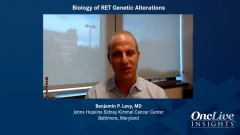
Next Steps for RET Fusion+ NSCLC
Episodes in this series

Benjamin P. Levy, MD: We’ll have to see how it goes. Where do we go from here? We talked about pralsetinib and selpercatinib, testing. Are there unmet needs? Where do we go here in the future for this genotype and in all genotypes?
Jared Weiss, MD: I’ll summarize what’s easy. What do you see as No. 1? Every nonsquamous stage IV patient absolutely merits molecular testing. Ideally that molecular testing should be a next-generation platform with a good RNA fusion panel. We’ve told you our opinions on what those are. No. 2, if you find RET, you should treat RET, in my opinion, in the front line. Certainly it should be treated, and it should not be treated with the old-school ineffective and toxic agents. It should be treated with selpercatinib or pralsetinib.
As an academic, I was obliged to take that diversion before actually answering the questions you asked, which is what is the unmet need, and where do we go from here? I would say that while a PFS [progression free survival] of 19 months or so is great when compared with chemotherapy, and while these toxicities are great compared with chemotherapy, it’s really not that long. If I came into your office tomorrow, and you said, “Jared, you have lung cancer—congratulations, I can control it for 19 months with this pill,” I’m not going to be that happy, right, because compared with a noncancer life, that’s not as good as we want. We have moved onto a next-generation drug, but I’m excited to eventually see drugs that last a lot longer than this in the front line. As you mentioned, we don’t know a lot about the resistance changes in RET. My suspicion is that they’re going to be quite heterogeneous in contrast to, for example, what we saw in the frontline EGFR experience. Of course, once we know what those are with greater granularity, people are going to try to action them, and we’ll have next-line drugs.
Benjamin P. Levy, MD: I’ve been on some recent calls in which the questions have been for all genotypes: Where do we go? Where does the science delve into? Clearly 1 of the areas that the science has to delve is in sequencing strategies, and the sequencing strategies are based on understanding mechanisms of resistance that we can then target. Another area we need to think about is up front with the drug. What can we combine with these drugs that can improve that PFS or make it even longer? You know, we’ve been in this field a long time, or at least it feels like a long time. We know that they’re baby steps. With each scientific gain, it’s baby steps. This is a big step, but I’m curious to see where the science will head. Can we eliminate heterogeneity up front before we wait for resistance and give another targeted drug? This is where there are a lot of challenges on trial design. Are we going to do trials that look at a TKI [tyrosine kinase inhibitor] plus drug up front, and we do trials where we give the TKI first? Then when they develop mechanisms of resistance, we’re going to layer in another drug? I would agree with you. If a patient comes in and you’re telling them that you can give them a drug, and the durability of response is 20 months, it’s still just 2 years. We’re in 2020, although it feels like we’re way behind in this country.
Jared Weiss, MD: It’s been a year.
Benjamin P. Levy, MD: We’ve got to advance it further. We’ve got to capitalize on the science and move it quickly. But it’s an exciting time.
Jared Weiss, MD: We’ve had this nice advance. You and I are both of the opinion to use this agent in the front line. I want to express an opinion that the tools that we’ve learned from EGFR and ALK and others can probably be applied to RET. What I mean is that if you have slow progression that is not a threat to the patient, there’s nothing wrong with continuing drug-path progression. If you have oligo- progression, meaning just 1 or 2 spots growing, there’s nothing wrong with using a little help from your neighborhood surgeon or radiation oncologist to prolong benefit of drug. If you have a lot of intracranial disease that you’ve cleared up with 1 of these agents, and you’re looking to switch to chemotherapy, it’s not standard. There is no approval for this, but in my opinion, it is reasonable to continue 1 of these agents with chemotherapy.
Benjamin P. Levy, MD: I agree. Progression is heterogeneous. Trying to understand what to do is important and critically thinking at that pivot point what you’re going to do can make meaningful difference for a patient.
Jared Weiss, MD: I will address 1 question that a community partner recently asked me by text message: Does chemotherapy work for these patients? It works at least as well for these patients. And there’s some anecdotal evidence out there that, like ALK, pemetrexed-based regimens may work particularly well in the RET population. Once you’re done with RET-targeted therapy, whether you rebiopsy or not, if you’re moving onto chemotherapy, pembrolizumab-carboplatin or pembrolizumab-carboplatin-bevacizumab are perfectly reasonable options to consider.
Benjamin P. Levy, MD: Agreed. That’s a good, clinically relevant point about what to do when these drugs unfortunately stop working outside a clinical trial.
Transcript Edited for Clarity


